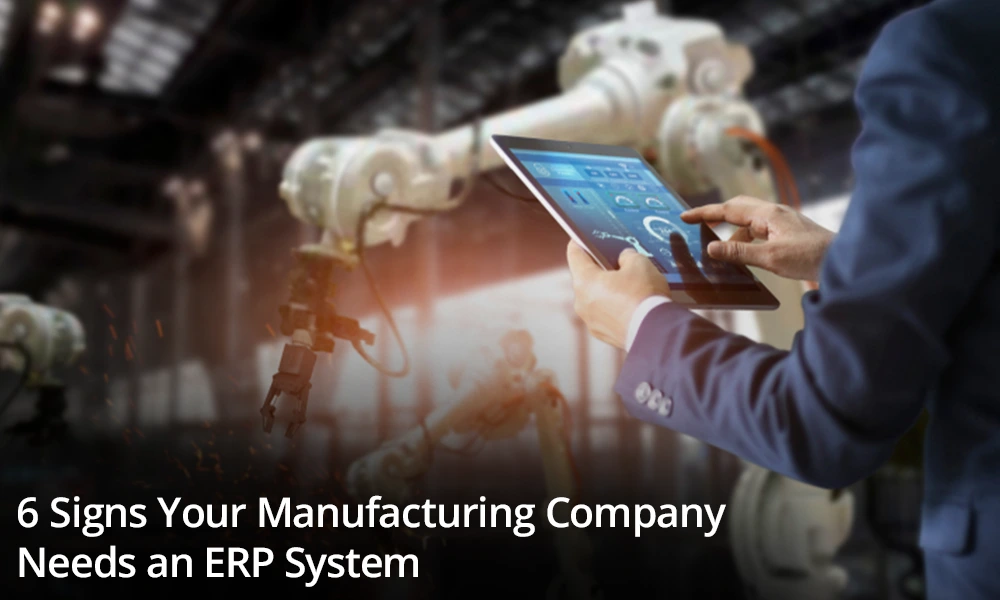Everyone knows that increasing sales is crucial to grow your business, but another key factor for expansion often gets overlooked—resource planning. As the demand for production goes up, maintaining quality consistency and delivery standards is vital too.
You may well know, with a growing business comes increased complexity. Soon, there comes a point when manual resource planning is not feasible or quick enough, and utilising technology becomes a necessity.
If you are having trouble keeping up with the production demands, it may be an indication that your business is in urgent need of an ERP system.
So, here are 6 signs that it is time to invest in ERP software for manufacturing.
1. Poor Data Management
For making any business decision, it is essential to have hassle-free access to data.
For example, before starting work on a particular order, you need to know material costs, which other projects are in the pipeline, your current inventory, etc. If you are unable to find out such information quickly and easily, it may point to improper data management.
This is a problem that can be solved with manufacturing ERP systems. An ERP system automatically consolidates all the information and statistics about your business, presenting it in a comprehensive format from which you can derive useful insights.
2. Incompatibility Among Current Systems
Often in organisations, generally each department has their own systems or processes, and information is not easily transferable between departments.
Imagine this situation—the sales department hands order specifications to the production department, who have to manually enter its details into their system. For billing, the accounts department works on a separate system again.
This happens because the software systems of various departments are incompatible with each other. Hence, there are multiple databases on different systems, which increases the margin for error, especially during manual data entry.
But an ERP software for manufacturing bypasses this problem by integrating everything into a single database that can be freely accessed by all departments. Moreover, the ERP system can directly connect with suppliers and customers, making the end-to-end process streamlined.
Thus, the productivity of the entire company is ramped up and so are your profits!
3. Inaccurate Inventory Records
It is vital to have precise inventory count at every step of the business process. Shortage of inventory can bring production to a standstill, delay order deliveries, and lead to increased shipping expenses.
On the other hand, excess inventory takes up warehouse space and ties up finances that can be utilised more effectively elsewhere. In a technology-focused industry, inventory can also become obsolete. For example, if a mobile phone production firm has excess camera modules in their inventory, and a newer version of camera modules is developed, the surplus modules will become unusable.
With an ERP system, you can track inventory records at every point in the supply chain, and even at different locations. Any anomalies can be identified and rectified quickly, thus increasing the overall efficiency.
4. Frequent Issues in Production Scheduling
Increasing customer satisfaction is the key to business profitability. Hence, on-time order delivery is the core of a manufacturing enterprise. For this, you must be aware of ongoing projects and the machines or workers on hand, using which you can create timelines for new orders.
If your enterprise follows a manual planning process, you must be observing a high turnaround time and increased chances of error.
Manufacturing ERP systems have evolved to solve this problem through the Master Production Scheduling (MPS) feature, which automates the planning process by analysing supply and demand information. You no longer need to manually ensure whether raw materials have reached the correct place at a right time, because the ERP software does it for you.
5. Low Visibility of WIP Projects
This is especially common for discrete manufacturers or businesses that have production facilities at different locations (for instance, various parts are produced at separate plants and final assembly is done somewhere else).
In such a situation, it’s difficult to keep a track of all the inventory in production and share a delivery deadline with the buyers.
ERP for discrete manufacturingcangive you complete real-time visibility of all the processes happening at different locations so that you can promise accurate timelines to your customers.
6. Lack of Remote Working Facility
In the digital age, remote working is not only the norm but also a necessity. When your business development personnel are able to access data such as pricing and delivery schedules on the go, it gives them the edge they need to convert a sale.
With a cloud-based ERP system, this becomes an achievable feat.
If your enterprise is facing any of the above, a manufacturing ERPsystem is a solution you need, which can help streamline all your business processes and maximise returns.
Looking for ERP software for manufacturing? At SourcePro, we offer custom ERP systems for businesses of all sizes. Schedule a consultation today.
